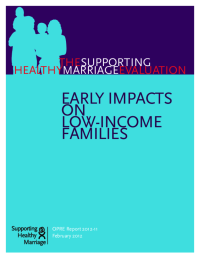Early Impacts from the Supporting Healthy Marriage Evaluation
The Supporting Healthy Marriage (SHM) evaluation was launched in 2003 to test the effectiveness of a skills-based relationship education program designed to help low-income married couples strengthen their relationships and, in turn, to support more stable and more nurturing home environments and more positive outcomes for parents and their children. The evaluation is led by MDRC, in collaboration with Abt Associates and other partners, and is sponsored by the Department of Health and Human Services.
The SHM program is a voluntary, yearlong, relationship and marriage education program for low-income, married couples who have children or are expecting a child. The program provides group workshops based on structured curricula; supplemental activities to build on workshop themes; and family support services to address participation barriers, connect families with other services, and reinforce curricular themes. The study’s rigorous random assignment design compares outcomes for families who are offered SHM’s services with outcomes for a similar group of families who are not offered SHM’s services but can access other services. This report presents estimated impacts on the program’s targeted outcomes about one year after couples entered the study.
Key Findings
- The SHM program produced a consistent pattern of small positive effects on multiple aspects of couples’ relationships. Relative to the control group, the program group showed higher levels of marital happiness, lower levels of marital distress, greater warmth and support, more positive communication, and fewer negative behaviors and emotions in their interactions with their spouses. The consistency of results across outcomes and data sources (surveys and independent observations of couple interactions) is noteworthy.
- Compared with individuals in the control group, program group members reported experiencing slightly less psychological and physical abuse from their spouses. Men and women in the program group reported less psychological abuse in their relationships, and men in the program group reported that their spouses physically assaulted them less often, compared with their control group counterparts.
- Men and women in the program group reported slightly lower levels of adult psychological distress (such as feelings of sadness or anxiety) than their control group counterparts.
- The program did not significantly affect whether couples stayed married at the 12-month follow-up point.
This study provides some encouraging evidence that a couples-based, family-strengthening intervention can yield positive effects when delivered on a large scale to low- to modest-income couples with diverse backgrounds. The importance of the short-term impacts, however, will ultimately depend on whether the program yields positive impacts on marital stability and parents’ and children’s well-being over time. The effects of SHM on longer-term outcomes — including effects on divorce and separation, parenting, father engagement, and child well-being two and a half years after couples enrolled in the study — will be explored in subsequent reports.






